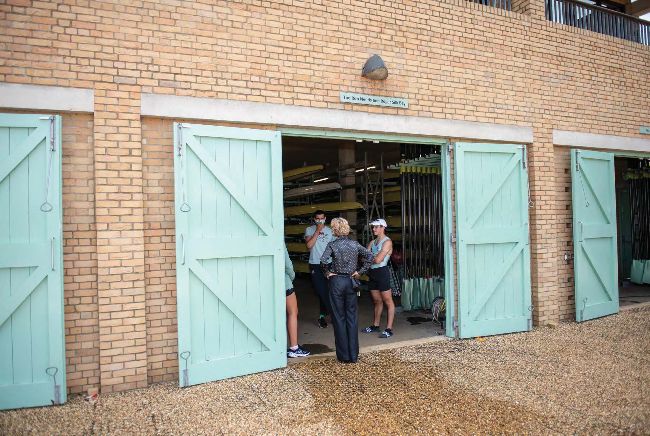Blues Unite
A visit to a transformed Cambridge University Boat Club, as they welcome a new era of rowing and the start of the 2021 Boat Race season
WORDS + PHOTOGRAPHY: BENEDICT TUFNELL
It’s a very different world to the one they left six months ago. It’s September 1st 2020 and athletes and staff have assembled at Ely, Cambridgeshire for the first Boat Race training session at Cambridge University since March 15th - the day the 2020 Boat Races were cancelled. Hand-sanitiser, face masks and physical distancing have become as familiar as water bottles and blisters - but there is a more meaningful change afoot.
In the biggest structural shake-up in its nearly 200-year rowing history, in May the university’s three boat clubs - comprising Cambridge University Boat Club (CUBC), Cambridge University Women’s Boat Club (CUWBC) and Cambridge University Lightweight Rowing Club (CULRC) - announced a collective decision to disband and reform as a single club, all under the name CUBC.
Until now the three Cambridge University rowing clubs had existed entirely independently, complete with their own coaches, constitutions, management committees and finances. It’s the system that still exists at rivals Oxford University, and one that arose out of the gradual evolution of the Boat Race over nearly 200 years.

Club Chair Annamarie Phelps.
Briefly - CUBC was founded as a men’s only rowing club in 1828 in order to issue a challenge of a boat race in early 1829 to Oxford University. The first women’s Boat Race came almost 100 years later, necessitating the formation of CUWBC.
CULRC was founded in 1974 in order to provide a lightweight men’s crew to race Oxford. When a lightweight women’s event was established ten years later in 1984, the new squad of lightweight women joined CUWBC. Thus three clubs were formed.
With the new setup comes newly appointed Club Chair Annamarie Phelps. Formerly Chair of British Rowing and Vice-Chair of the British Olympic Association (BOA), she is a CUWBC alumna whose own rowing career began here in Cambridge at Lady Margaret Boat Club.
Phelps explains that while CUBC may be the same name they have used since 1828, they have reconstituted the club “to create something entirely new”.
The change comes five years after the momentous and hugely successful move in 2015 to put the women on a level playing field with the men, by moving the women’s Boat Race to the same day and course, with equal television coverage. Like then, Phelps says the reformation of the CUBC had been in the works for some time and required a number of things to come together.
“It is something we have been working towards for a number of years now, and it just seemed to be the logical time. The three clubs had already started to work more and more closely together, and now we have our wonderful boathouse [opened in 2017] in Ely to share; so it just felt like the right time in terms of equality, resources and efficiencies. We can avoid needless duplication and fill in the gaps in resources. We have amalgamated three clubs that were very different in scale and how they worked, so it’s not going to be easy, but we believe it’s the right thing at the right time,” says Phelps.
Gerrard Kuenning, acting as Club Secretary on Cambridge’s Rowing Management Board believes the change was necessary to reflect the core values of the rowers and the university. “Having three disparate clubs that have the same goals and same boathouses but are not unified doesn’t really stand well with the ideas of equity and equality that are so valuable to us. As members of this club we wanted to be able to represent ourselves to the rowing community - and the wider world - as people that cherish these values and want to bring them forward into prominence.”
2021 CUBC Men’s President Callum Sullivan describes the new one-club structure as an opportunity to optimise their training environment, with the different squads now better positioned to learn from and support one another, as well as promoting healthy competition between them.
Reflecting on the unceremonious end to their 2020 season, Sullivan says the cancellation was harder to take than a loss. “But it’s great to be back together, with a renewed energy and a larger, unified squad.”
Gerrard Kuenning admits that with the pandemic still in effect, the lead up to their return to training didn’t come without apprehension, with many of the students and coaches unsure as to how things would function amid such strict safety measures. But thanks to the leadership of coaches and the student presidents it has quickly come to feel like business as usual.
“The biggest structural shakeup in its nearly 200-year rowing history.”

Sanitiser and face masks are the new normal at CUBC.
“It’s a slight shock to the system,” says the 2021 CUBC Women’s President, Bahamian Sophie Payne; “but it’s just great to be back together and training again after such a long time.”
For Payne, and her fellow student athletes, there has been a lot to get used to. “We will be following British Rowing guidelines and taking all the precautions we can such as wearing masks before and after getting in the boat, staggering training sessions in smaller groups, and wiping down and sanitising everything as often as possible. But at the end of the day, when we are out on the water, rowing in boats, it’s no different to how it was, and that’s really refreshing.”
Previously published in Issue 33 of Row360